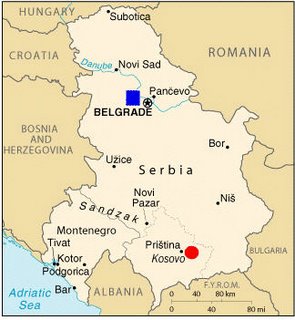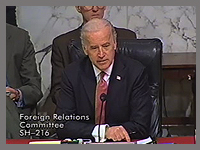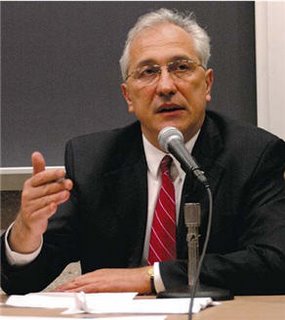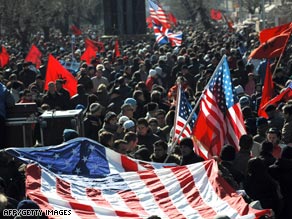Kosovo citizens today await an independent, sovereign and democratic country, a state for all with equal rights. [Prime Minister Hashim Thaci – pictured here (center) leading Kosovo’s Independence Day march earlier today]
 Nine years after US-led NATO forces “liberated” them from their “Serb oppressors,” Kosovo’s ethnic Albanians will convene a special session of their provincial assembly today to declare Independence from Serbia. And, in so doing, they will defy not only the Serbs but also their Russian enablers, both of whom vowed this day would never come.
Nine years after US-led NATO forces “liberated” them from their “Serb oppressors,” Kosovo’s ethnic Albanians will convene a special session of their provincial assembly today to declare Independence from Serbia. And, in so doing, they will defy not only the Serbs but also their Russian enablers, both of whom vowed this day would never come.
Notwithstanding their protestations, however, the Serbs had to know there was little they could do to stem the inexorable tide of history, which this move reflects. After all, as the Financial Times notes:
Kosovo will be the sixth state carved from the former Serbian-dominated Yugoslav federation since 1991, after Slovenia, Croatia, Macedonia, Bosnia and Montenegro.
Nevertheless, Serbian leaders warn that there will be:
…an ‘energetic response’ against the United States and EU countries which might recognize Kosovo’s independence.
In fact, Serbia’s parliament passed a resolution last August threatening to cut ties with any country that recognizes an independent Kosovo. Which, of course, seems (pathologically?) self-defeating, if not laughable, for a country desperately seeking political and economic ties…no?
Frankly, despite my intimate sympathies with the Serbs, even I knew this day would come. Therefore, to recognize the occasion, I shall suffice to republish my April 4, 2007 commentary titled Kosovo: wither Serbia’s Alamo, in which I lamented, though predicted, this day.
—————————-
Twenty-five years ago, the British considered the Falkland Islands so vital to their sovereignty that they dispatched their armada to assert dominion over them. They did so because the islanders were poised to pledge allegiance to neighboring Argentina. Never mind that the Falklands were little more than a bleak and desolate cluster of islands situated 8,000 miles away.
 Therefore, it smacks of rank hypocrisy for the British to stand as the leading voice in Europe denouncing the Serbs for considering Kosovo so vital to their national sovereignty that they are threatening to deploy their army to assert dominion over it. And they are doing so because ethnic Albanians are poised to declare Kosovo an independent state.
Therefore, it smacks of rank hypocrisy for the British to stand as the leading voice in Europe denouncing the Serbs for considering Kosovo so vital to their national sovereignty that they are threatening to deploy their army to assert dominion over it. And they are doing so because ethnic Albanians are poised to declare Kosovo an independent state.
After all, Kosovo embodies as much historical, cultural and religious significance for the Serbs as Mecca holds for the Saudis. Moreover, it happens to be situated within Serbia’s universally recognized borders; i.e., not thousands of miles away.
Nevertheless, there was already virtual unanimity going into debate at the United Nations yesterday on a proposal to endorse the Albanians’ claim as the “final status” for Kosovo under international law. In fact, here’s how the foreign minister of Serbia ’s perennial European nemesis, Germany, expressed his country’s undisguised schadenfreude over the prospect of independence for Kosovo:
It’s never the case that all European partners have the same opinion in advance….That’s how it is in the Kosovo question. [German Foreign Minister Frank-Walter Steinmeier]
Alas, the only speed bump those jumping on this anti-Serbia bandwagon are likely to encounter will be over what price Russia and China will demand (from the US and EU) to get on board.
Yet, as remarkable as European consensus on Kosovo may be, it pales in comparison to the unprecedented consensus among congenitally fractious Serbs on the question of keeping Kosovo within Serbia. Indeed, here’s how Serbia’s religious leaders expressed their nation’s wholly forlorn mission to preserve this union:
[B]lackened minds want to change the status of Kosovo, our whole history, culture and statehood. [His Holiness Patriarch Pavle (92), 44th successor to the Throne of St Sava]
I’m calling on Russia, as the biggest Christian country, but also on China, to use their power of veto in the U.N. Security Council to prevent a crime against the Serbian people….The Serbs will never give up Kosovo. [Archbishop Amfilohije, a leader of Serbia’s Orthodox Church]
Unfortunately, the international military and political forces aligned against the Serbs are such that they would be better served by having their religious leaders lead them in serene prayers of acceptance than by having their political leaders lead them in jingoistic cries of defiance over Kosovo. After all, it will take a miracle for them to retain any control over this province when all is said and done.Indeed, defying the myth that all Serbs are pathologically nationalistic, it is telling that many of the 200,000 Serbs (compared to the 2 million Albanians) now living in Kosovo are not only packing up their bags, but also digging up the graves of loved ones to relocate to what little remains of “Mother Serbia” today.That said, given that most readers of this weblog are Americans, it would be remiss of me not to acknowledge the truly balkanized nature of this debate. Because the only thing most Americans know about Kosovo, or the Balkans for that matter, they probably gleaned from TV-news reports about ethnic cleansing, which invariably portrayed the Serbs as neo-Nazis committing genocidal crimes against Muslims.
However, this is not the forum, nor am I qualified, to reconcile the competing versions of history that the polyglot of ethnic and religious groups proffers to rationalize or lament the current state of affairs in the Balkans. Nevertheless, I believe it is fair to assert that the victims of ethnic cleansing were too often perpetrators and/or beneficiaries of ethnic cleansing themselves. Specifically, the only reason Serbs are fleeing Kosovo today is because they reasonably fear that the atrocities Albanians have been committing against them since 1999 – right under nose of UN protection forces – will only worsen once the UN confers independence.
 Meanwhile, it’s bad enough that most Americans are as ignorant about the origins and nature of the (religious and ethnic) conflicts that b
Meanwhile, it’s bad enough that most Americans are as ignorant about the origins and nature of the (religious and ethnic) conflicts that b
lew Yugoslavia asunder as they are about similar factors that are now blowing Iraq asunder.
But it must add salt to the wounded pride of all Serbs when even relatively informed Americans make statements about the status of Kosovo that reek of patent bias.
After all, this betrays not only America’s historical ties to Serbia but also the founding principles of American democracy. Yet this is precisely what no less an influential politician than Sen. Joseph Biden (D-DE), Chairman of the Foreign Relations Committee, has done in championing the cause of Kosovo independence:
[A]droit diplomacy to secure Kosovo’s independence could yield a victory for Muslim democracy, a better future for south-east Europe and validation for the judicious use of American power.
Nationalist politicians in Belgrade have embraced the fight against Kosovo’s independence to divert public attention from their own failures and Serbia’s stalled bid for European Union membership. The actions of Vojislav Kostunica, Serbia’s prime minister have been particularly disappointing. [Op Ed in Financial Times dated 2 January 2007]
 On the other hand, the Serbs could not have tailored a more ideally suited ambassador than Ivan Vujacic to represent their interests in the United States. Because no ambassador in Washington has been more adept than he at matching political wits with self-righteous American politicians – and on their own terms.Indeed, that Ambassador Vujacic has managed this feat with enviable diplomatic tact, while defending what most foreign-policy experts assert is his country’s unsustainable position on Kosovo, is quite extraordinary. For example, even though he probably sympathizes with the critical mass of progressive Serbs who lament the inevitability of Kosovo independence, here’s how the Ambassador defended the pyrrhic aspirations of nationalists back home against Biden’s pronouncements on Kosovo:
On the other hand, the Serbs could not have tailored a more ideally suited ambassador than Ivan Vujacic to represent their interests in the United States. Because no ambassador in Washington has been more adept than he at matching political wits with self-righteous American politicians – and on their own terms.Indeed, that Ambassador Vujacic has managed this feat with enviable diplomatic tact, while defending what most foreign-policy experts assert is his country’s unsustainable position on Kosovo, is quite extraordinary. For example, even though he probably sympathizes with the critical mass of progressive Serbs who lament the inevitability of Kosovo independence, here’s how the Ambassador defended the pyrrhic aspirations of nationalists back home against Biden’s pronouncements on Kosovo:
The truth of the matter is that Kosovo has a dismal record regarding basic security, the rule of law and respect for property and human rights for non-Albanians. Democracy should be universal and not ethnic, nor based on religion. Should the threat of violence be rewarded by a quick move to independence or is Kosovo just a propaganda tool for the Muslim world as Senator Biden seems to suggest?
Serbia expects that the principles of international law and the UN Charter should be adhered to. It does not believe that a democratic nation should be dismembered. It has stated so publicly. Surely, this is not conspiracy. [Op Ed in Financial Times dated 8 January 2007]
Touché. Frankly, if Biden – infamous as he is for plagiarizing the glib words of British politicians – had any real political integrity, Ambassador Vujacic’s rebuttal would have compelled him to acknowledge at least having some political scruples about his cocksure declarations on Kosovo.Of course, it will be interesting to see how white Americans react in 50 years when ethnic Mexicans in California (who will probably outnumber them 10:1 by then) push for independence (to annex it to Mexico, much as Serbs suspect ethnic Albanians want to annex Kosovo to their big-brother state, Albania). Because, then, I have no doubt that American politicians will be proffering the arguments of Ambassador Vucjacic, not those of Sen. Biden, to defend the territorial integrity of the United States of America.
____________________
 NOTE: The UN, most notably the US and EU, will recognize Kosovo. More important, a NATO peacekeeping force, which, significantly, includes American and British soldiers, will ensure that Serbs limit their protests to bellicose rhetoric.
NOTE: The UN, most notably the US and EU, will recognize Kosovo. More important, a NATO peacekeeping force, which, significantly, includes American and British soldiers, will ensure that Serbs limit their protests to bellicose rhetoric.
But frankly, as much as they cherish historic religious ties with Kosovo, Serbs clearly covet future economic ties with Europe much more – albeit begrudgingly. Also, no matter how much their Slav brothers in Russia foment their pyrrhic claims on Kosovo, Serbs appear no more interested in being the political and economic bedfellows of Russians today than they were during the height of the Cold War.
Therefore, I predict that, after a Slavic period of mourning, Serbs will come to terms with the loss of Kosovo.
Related Articles:
Serbs cry uncle over Kosovo
Brief history of former Yugoslavia
Kosovo independence
Leave a Reply
You must be logged in to post a comment.